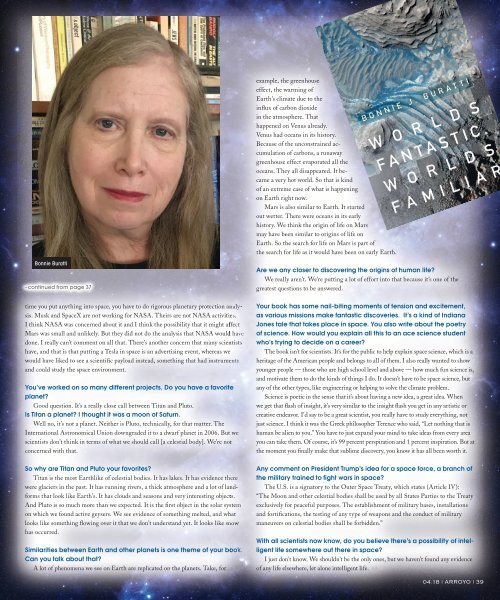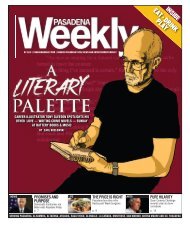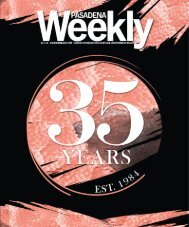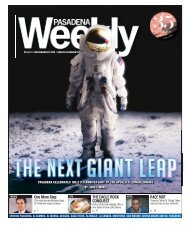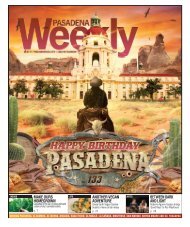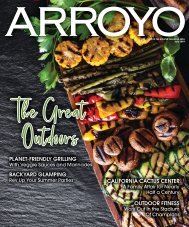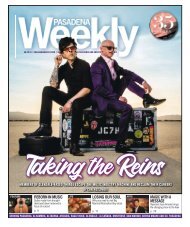April 2018
Create successful ePaper yourself
Turn your PDF publications into a flip-book with our unique Google optimized e-Paper software.
example, the greenhouse<br />
effect, the warming of<br />
Earth’s climate due to the<br />
influx of carbon dioxide<br />
in the atmosphere. That<br />
happened on Venus already.<br />
Venus had oceans in its history.<br />
Because of the unconstrained accumulation<br />
of carbons, a runaway<br />
greenhouse effect evaporated all the<br />
oceans. They all disappeared. It became<br />
a very hot world. So that is kind<br />
of an extreme case of what is happening<br />
on Earth right now.<br />
Mars is also similar to Earth. It started<br />
out wetter. There were oceans in its early<br />
history. We think the origin of life on Mars<br />
may have been similar to origins of life on<br />
Earth. So the search for life on Mars is part of<br />
the search for life as it would have been on early Earth.<br />
Bonnie Buratti<br />
–continued from page 37<br />
Are we any closer to discovering the origins of human life?<br />
We really aren’t. We’re putting a lot of effort into that because it’s one of the<br />
greatest questions to be answered.<br />
You’ve worked on so many different projects. Do you have a favorite<br />
planet?<br />
Good question. It’s a really close call between Titan and Pluto.<br />
Is Titan a planet? I thought it was a moon of Saturn.<br />
Well no, it’s not a planet. Neither is Pluto, technically, for that matter. The<br />
International Astronomical Union downgraded it to a dwarf planet in 2006. But we<br />
scientists don’t think in terms of what we should call [a celestial body]. We’re not<br />
concerned with that.<br />
Your book has some nail-biting moments of tension and excitement,<br />
as various missions make fantastic discoveries. It’s a kind of Indiana<br />
Jones tale that takes place in space. You also write about the poetry<br />
of science. How would you explain all this to an ace science student<br />
who’s trying to decide on a career?<br />
The book isn’t for scientists. It’s for the public to help explain space science, which is a<br />
heritage of the American people and belongs to all of them. I also really wanted to show<br />
younger people — those who are high school level and above — how much fun science is,<br />
and motivate them to do the kinds of things I do. It doesn’t have to be space science, but<br />
any of the other types, like engineering or helping to solve the climate problem.<br />
Science is poetic in the sense that it’s about having a new idea, a great idea. When<br />
we get that flash of insight, it’s very similar to the insight flash you get in any artistic or<br />
creative endeavor. I’d say to be a great scientist, you really have to study everything, not<br />
just science. I think it was the Greek philosopher Terence who said, “Let nothing that is<br />
human be alien to you.” You have to just expand your mind to take ideas from every area<br />
you can take them. Of course, it’s 99 percent perspiration and 1 percent inspiration. But at<br />
the moment you finally make that sublime discovery, you know it has all been worth it.<br />
time you put anything into space, you have to do rigorous planetary protection analysis.<br />
Musk and SpaceX are not working for NASA. Theirs are not NASA activities.<br />
I think NASA was concerned about it and I think the possibility that it might affect<br />
Mars was small and unlikely. But they did not do the analysis that NASA would have<br />
done. I really can’t comment on all that. There’s another concern that many scientists<br />
ts<br />
have, and that is that putting a Tesla in space is an advertising event, whereas we<br />
would have liked to see a scientific payload instead, something that had instruments<br />
ts<br />
and could study the space environment.<br />
So why are Titan and Pluto your favorites?<br />
Titan is the most Earthlike of celestial bodies. It has lakes. It has evidence there<br />
were glaciers in the past. It has running rivers, a thick atmosphere and a lot of landforms<br />
that look like Earth’s. It has clouds and seasons and very interesting objects.<br />
And Pluto is so much more than we expected. It is the first object in the solar system stem<br />
on which we found active geysers. We see evidence of something melted, and what<br />
looks like something flowing over it that we don’t understand yet. It looks like snow<br />
has occurred.<br />
Similarities between Earth and other planets is one theme of your book.<br />
Can you talk about that?<br />
A lot of phenomena we see on Earth are replicated on the planets. Take, for<br />
Any comment on President Trump’s idea for a space force, a branch of<br />
the military trained to fight wars in space?<br />
The U.S. is a signatory to the Outer Space Treaty, which states (Article IV):<br />
“The Moon and other celestial bodies shall be used by all States Parties to the Treaty<br />
exclusively for peaceful purposes. The establishment of military bases, installations<br />
and fortifications, the testing of any type of weapons and the conduct of military<br />
maneuvers on celestial bodies shall be forbidden.”<br />
With all scientists now know, do you believe there’s a possibility of intelligent<br />
life somewhere out there in space?<br />
I just don’t know. We shouldn’t be the only ones, but we haven’t found any evidence<br />
of any life elsewhere, let alone intelligent life. ||||<br />
04.18 | ARROYO | 39


